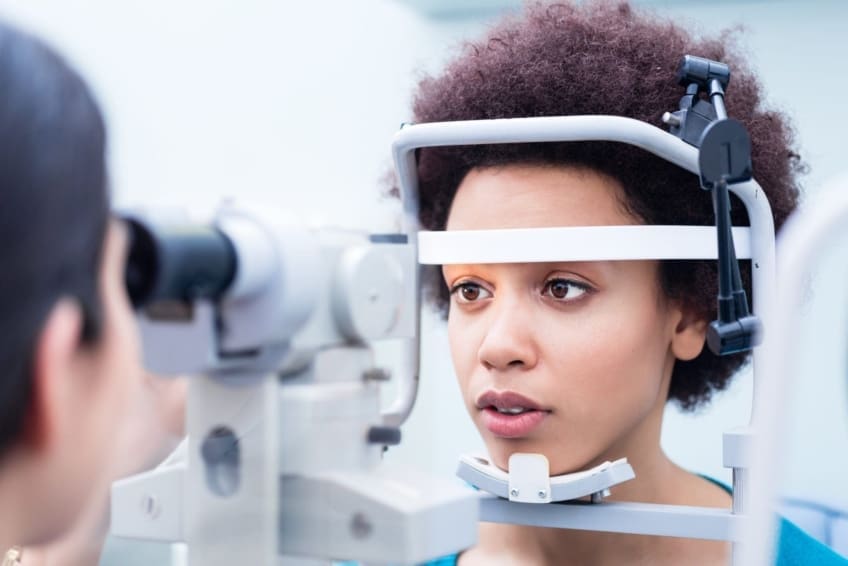
What is glaucoma?
Glaucoma is an eye disease that may cause loss of vision. It usually happens when fluid builds up in the eye, causing an increase in pressure. This damages the eye’s optic nerve.
Symptoms
At first, glaucoma has no symptoms. It causes no pain and your vision is normal. Eventually, without treatment, you will start losing your peripheral (side) vision. You might miss seeing objects out of the corner of your eye. Over time, it will seem like you’re looking through a tunnel. If your glaucoma is left untreated, your vision may gradually decrease until it is completely gone.
Many people who have glaucoma aren’t aware they have the disease. By the time they notice loss of vision, the eye damage is severe.
Rarely, an individual will have an acute (sudden or short-term) attack of glaucoma. In these cases, the eye becomes red and extremely painful. Nausea, vomiting, and blurred vision may also occur. This is an eye emergency. Call your eye doctor right away if you experience these symptoms.
What causes glaucoma?
Normally, fluid in your eye nourishes the eye and keeps it healthy. After the fluid circulates through the eye, it empties through a drain in the front of your eye. In people who have glaucoma, the fluid doesn’t drain properly. Instead, it builds up and causes increased pressure in the eye and damages the optic nerve.
How is glaucoma diagnosed?
Glaucoma is usually diagnosed by an optometrist or ophthalmologist. These are people specially trained to provide care for eyes. They will give you a complete eye exam, including tests that can diagnose glaucoma. The tests include:
- Visual acuity test: This measures how well you see at different distances.
- Visual field test: This measures your peripheral vision.
- Dilated eye exam: This allows your eye doctor to examine your retina and optic nerve for signs of damage or other eye problems.
- Tonometry: This measures the pressure inside the eye.
- Pachymetry: This measures the thickness of your cornea (the outer layer of your eye).
Can glaucoma be prevented or avoided?
Some people are at a higher risk of developing glaucoma. They include people who:
- Are 40 years of age or older
- Have a family history of glaucoma
- Have high pressure in the eyes
- Have diabetes
- Have hypertension
- Have heart disease
- Have near-sightedness (it is difficult for you to see objects in the distance)
There’s nothing you can do to avoid getting glaucoma. But you can prevent it from having a big impact on your vision. The best way to do this is by getting an eye exam regularly by an optometrist or ophthalmologist. People 18 to 60 years of age should have an eye exam every 2 years. After age 60, you should have an eye exam once a year.
If you have diabetes, hypertension, or heart disease, follow your doctor’s instructions for managing and controlling those conditions to reduce your risk of glaucoma.
Early diagnosis and treatment of glaucoma can prevent damage to the eye’s nerve cells and prevent severe vision loss.
Glaucoma treatment
There are several treatment options for glaucoma. The first treatment option usually is either medicated eye drops or pills. These aim to lower the pressure in your eye, prevent further nerve damage, and stop vision loss. This treatment works for many people. Keep in mind it may be hard to remember to take your medicine. That’s because glaucoma often doesn’t cause symptoms. But it’s important to take it as your doctor prescribed.
If the eye drops or pills don’t help relieve the pressure in your eye, your doctor may suggest laser treatment. During this procedure, a laser is used to open the drain where fluid flows out of your eye. It’s a painless procedure. If that procedure doesn’t work, you may need surgery to create a new channel where fluid can flow out of your eye. Talk with your doctor about the best option for you.
Living with glaucoma
If your glaucoma is caught and treated early, you might not notice any difference in your vision. You can lead a normal life with no symptoms, as long as you take your medicine every day. Your eye doctor will likely want to see you every 3 to 6 months for a check-up.
If you have lost some of your vision, talk to your eye doctor. They may be able to suggest some services or devices that can help you make the most of your remaining vision. Also, community agencies may offer counseling, training, or other special services for people who have impaired vision.
Questions for your doctor
- What is the right treatment for me?
- Will I have to continue my treatment for the rest of my life?
- Does this treatment have any side effects?
- Is surgery an option for me? Will I need to use eye drops after surgery?
- Should I continue to drive?
- Can I continue with my current activities?
- Are there any lifestyle changes I should make?
- What’s the difference between an optometrist and an ophthalmologist?
- Will my glaucoma get worse?
Resources
Centers for Disease Control and Prevention: Don’t Let Glaucoma Steal Your Sight!
National Institutes of Health, MedlinePlus: Glaucoma
National Institutes of Health, National Eye Institute: Glaucoma
![]()
Copyright © American Academy of Family Physicians
This information provides a general overview and may not apply to everyone. Talk to your family doctor to find out if this information applies to you and to get more information on this subject.



